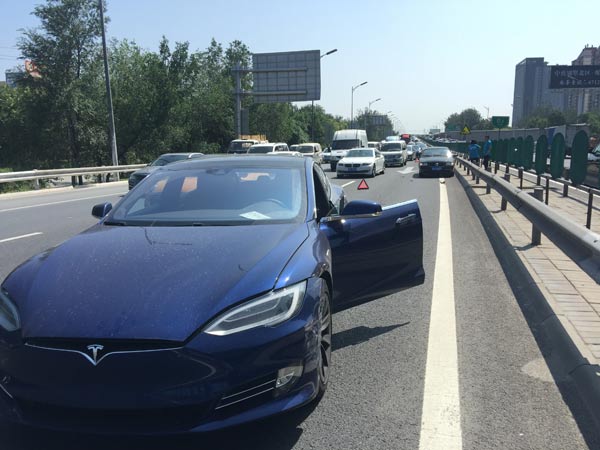 |
|
The Tesla Model S, which was involved in an accident in Beijing on Tuesday. Luo Zhen / for China Daily |
A Tesla Model S, with the autopilot software engaged and driver's hands off the steering wheel, was involved in a collision in Beijing last week, China's first known Tesla accident involving its self-driving Autopilot system.
Early Tuesday morning, a blue Tesla Model S ran into the back of a stationary black Volkswagen Santata on the North Fifth Ring Road.
Luo Zhen, the Tesla driver, told China Daily the car kept going forward, but did not conform to the car's claimed priority reaction of automatically following the vehicle in front which switched lane to avoid a collision.
"My car hit the right side of a black Santana that was stopped in the inner lane of the road after it had developed some mechanical problem. After the collision, I had to manually stop the car, otherwise it would have kept going, as if it had just hit a speed bump," he said.
He could see almost half of the Santana's rear before the crash happened, he said, and there was around five seconds to react, but Tesla's Autopilot system failed to spot the black vehicle in front and crashed into it, after another car passed the Santana.
Luo added he has been driving for seven years, and has never been involved in an accident before.
Duan Zhengzheng, senior public relations manager at Tesla China, declined a telephone interview request on Friday.
"It might be a misjudgment by the car. There could be malfunction in the system, as the Autopilot system is a driver assistant feature based on Adaptive Cruise Control technology, instead of real autonomous driving technology," said Jia Xinguang, a seasoned independent analyst in Beijing,
The accident has cost Luo 50,000 yuan ($7,525) in repairs. While the Santana's taillight and reflectors were damaged, the left front bumper, left front headlight, left front fender and left mirror of the Tesla were damaged.
Believing technical bugs exist in the Autopilot system, Luo said Tesla should take half of the responsibility, while the other half should be paid by the Santana's driver who was illegally parked.
Luo contacted Tesla's representative but has not yet received any feedback from Tesla China.
Luo, who spent more than 20,000 yuan on the optional Autopilot Convenience Features on purchasing the car in July, criticized Tesla for exaggerating the automatic driving function and only using a small space in the manual to warn users that it is only an assistance driving system.
He has been in contact with a lawyer who has encouraged him to sue Tesla for exaggerated advertising, but he has not yet decided what his next move will be.
However, Tesla's manual specifically warns drivers not to remove their hands from the steering wheel, not to mention it is illegal to do so in China. So Luo himself might be open to charges.
China has been one of the largest Tesla markets since the Model S sales volume rocketed more than 300 percent in the first quarter this year.
The world's first fatal Tesla Autopilot crash happened on May 7 in Williston in the United States. In a blog post, Tesla reiterated that customers are required to agree that the system is in a "public beta phase" and the driver is required to "maintain control and responsibility for your vehicle".
While Tesla has touted its Autopilot system in its marketing without any statements of responsibility, Volvo Cars announced in October it will accept full responsibility for any accidents caused by its future autonomous driving cars, becoming the world's first automaker to do so. Some other car manufacturers have followed its example and declared they will be responsible for autonomous driving accidents in certain circumstances.
